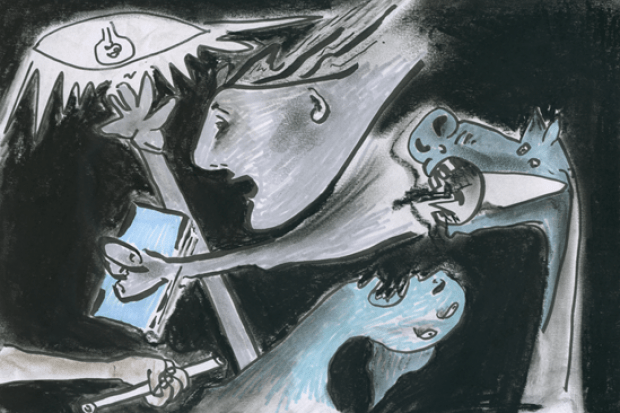Once, I had a flourishing career in higher education. I had just been promoted to associate professor and was feeling that all the years of hard work were starting to pay off. But these days, I just have a job – and one that I don’t really want any more.
How could this have happened? Did my computer self-destruct, taking with it years of research? Did an undergraduate take out my eye with a well-aimed paper dart during a particularly heavy Friday-afternoon lecture?
No. Reader, I was suspended.
I’m now back at work because, well, I didn’t do anything wrong. But it took the management four months to admit that. And there is so much that I want to get off my chest.
I’m talking to you, Professor Neoliberal Manager. I want you to understand that if you suspend academics, you are destroying their careers in small or large measure. They may regain their academic spirit somehow, somewhere, but the damage to their faith in universities will be terminal. Academics are proud creatures who don’t take kindly to attempts to annihilate them with a steady stream of official letters.
Perhaps you don’t care. But you should be careful, because they will be forever out to screw you over (preferably before they leave, but that’s just a detail). They will take every opportunity to bad-mouth your institution in general and you in particular. Even if you gag them with large amounts of banknotes, they will never again trust the colleagues who spoke ill of them in your little investigation. The saintly among them will forgive just one person – the one they most need. Everyone else will be dead to them.
Moreover, your lust for control opens you up to lawsuits. I am now knee-deep in knowledge of UK employment law and disciplinary procedures. I know what I’m talking about because of the leisure you gave me. I have a folder on my computer containing all the university policies – it’s right next to another one labelled “bullying”.
Your best hope is that the academic you suspended doesn’t have the money to hire a lawyer. But even without legal help, many will mount a case against you just for the buzz of seeing you wince when they wheel out Agoreyo v London Borough of Lambeth: the landmark 2017 case that makes it clear that suspending a professional, such as a teacher, medic or academic, can inflict particular damage on their careers, thus obliging their employers to tread particularly carefully.
Employers may be able to stretch their employees on a rack of processes provided that the rack appears status-blind. But put one foot wrong and you will be facing a tribunal. It might be for discrimination by virtue of characteristic or perception of characteristic. It might be for faults in your process. But whatever it is, it will cost your institution a lot to defend. Your vice-chancellor won’t like it. It will come up at your next appraisal.
Even those academics who use their unexpected leisure time to walk in the hills, admiring daffodils, will make your life very uncomfortable when they return. They will demand a face-to-face meeting and will hold you morally accountable for the harms you have enacted under a guise of “neutrality”. You may plead, in your defence, that you were just doing your job. But we’ve heard that one before. You abused your power. You had alternatives. You could have talked to the person you suspended to get to the truth, instead of wielding your power to cast them into limbo. Now you are stuck with someone who hates your guts.
My union representatives tell me that academic “disappearances” are becoming increasingly common across the UK, as the screw is turned ever tighter by the research excellence framework and now, God help us, the teaching excellence framework, too. Perhaps the suspended are in some ways the lucky ones. After all, ceasing to believe in universities as righteous, magnanimous or fair is to wake up to the world as it is. It is a decisive learning curve that may set its recipients free of a bad dependence on a fantasy. Perhaps it will even improve their scholarship. But their indignation and horror will always remain.
The author is an academic at a UK university.
Register to continue
Why register?
- Registration is free and only takes a moment
- Once registered, you can read 3 articles a month
- Sign up for our newsletter
Subscribe
Or subscribe for unlimited access to:
- Unlimited access to news, views, insights & reviews
- Digital editions
- Digital access to THE’s university and college rankings analysis
Already registered or a current subscriber? Login






